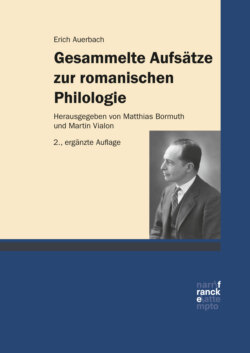Читать книгу Gesammelte Aufsätze zur romanischen Philologie - Erich Auerbach - Страница 22
VII. Lumen meridianum
ОглавлениеIn the verses of the prayerLobrede to Mary (Par. 33)
Qui sei per noi meridiana face
di caritade; e giuso, intra i mortali
sei di speranza fontana vivace
DanteDante uses the images meridiana face and fontana for the contrast ‘here in heaven’ and ’down on earth’. It is Bernard of Clairvaux whom DanteDante makes speak thus, and the same images are to be found, in the same contrast, in Bernard’s above-quoted sermon de aquaeductu (In Nativ. B. Mariae Virg. Sermo, § 2–4, Patr. Lat., CLXXXIII, 439–440); however they there refer not to Mary, but to Christ.
In Bernard’s sermon Christ is fons indeficiens, fons hortorum, fons vitae, but Mary is the aqueduct which leads the water to us:
… Descendit per aquaeductum vena illa coelestis, non tamen fontis exhibens copiam, sed stillicidia gratiae arentibus cordibus nostris infundens, aliis quidem plus, aliis minus. Plenus equidem aquaeductus, ut accipiant caeteri de plenitudine, sed non plenitudinem ipsam. Advertistis iam, ni fallor, quem velim dicere aquaeductum, qui plenitudinem fontis ipsius de corde Patris excipiens, nobis edidit ilium, si non prout est, saltem prout capere poteramus. Nostis enim cui dictum est: Ave gratia plena. …
The image meridiana face comes from Bernard’s interpretation of Cant. 1, 6, indica mihi quem diligit anima mea, ubi pascas, ubi cubes in meridie. It cannot be clearly gathered from the brief allusions of the sermon de aquaeductu, but is fully explained in the commentary to the quoted verse of the Canticles (Sermones in Cant. XXXIII, Patr. Lat., LXXXIII, 951). That noon which the bride searches for, while she still walks in the flesh, while she only through faith possesses a shadow of the truth, is eternal beatitude: etenim illa meridies tata est dies, et ipse nesciens vesperam; or a little later:
… sane extunc (after Christ’s ascension) elevatus est sol, et sensim demum diffundens suos radios super terram coepit paulatim ubique clarior apparere fervidiorque sentiri. Verum quantumlibet incalescat et invalescat …, non tamen ad meridianum perveniet lumen, nec in illa sui plenitudine videbitur modo, in qua videndus est postea, ab his dumtaxat, quos hac visione ipse dignabitur. O vere meridies, plenitudo fervoris et lucis, solis statio, umbarum exterminatio, desiccatio paludum, fetorum depulsio! O perenne solstitium, quando iam non inclinabitur dies! O lumen meridianum. …
[‘Show me that spot, as Jacob, Moses, Isaiah, still in the flesh, saw God face to face’:] vel etiam quomodo Paulus raptus in paradisum audivit verba ineffabilia, et Dominum suum Jesum Christum vidit oculis suis; ita ego quoque te in lumine tuo et in decore tuo per mentis excessum merear contemplari, pascentem uberius, quiescentem securius. Nam et hic pascis, sed non in saturitate; nec cubare licet, sed stare et vigilare propter timores nocturnos. Heu! nec clara lux, nec plena refectio, nec mansio tuta: et ideo indica mihi ubi pascas, ubi cubes in meridie. …
I should like to express my sincere thanks to my colleague Prof. W. KranzKranz, W. for his many valuable observations, and to Mr. H. S. BoydBoyd, H. S. for his kind help in translating this article into English.
